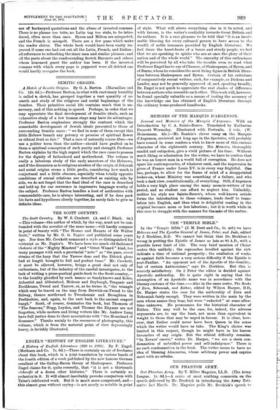THE "TEMPLE BIBLE."
In the "Temple Bible" (J. M. Dent and Co., ls. net) we have Hebrews and The Epistles General of James, Peter, and Jude, edited by J. Herkless, D.D. We cannot but think that Dr. Herkless is wrong in putting the Epistle of James as late as 80 A.D., with a possible lower limit of 150. The very brief mention of Christ makes this unlikely ; the reproaches levelled against the rich indicate a time of national prosperity ; the exaltation of works as against faith becomes a very serious difficulty if the Epistle is post-Pauline. "An opponent not of the Apostle of the Gentiles, but of certain Antinomians," says Dr. Herkless. But this is scarcely satisfactory. On 2 Peter the editor is decided against Apostolic authorship. He is quite right in saying that the assumption of an Apostolic name was in accordance with the literary customs of the time.—Also in the same series, The Books of Ezra, Nehemiah, and Esther, edited by Wilson Harper, D.D. Dr. Harper states the ease for the authorship of Ezra and Nehemiah fairly enough. They were written in the main by the men whose names they bear, but were "redacted" at some after- time unknown. He pronounces for the historical character of Esther. This may well be the case, for, indeed, the adverse arguments are, to say the leaat, not more than equivalent in weight to those that may be urged in favour. It is clear, how- ever, that Esther could never have been Queen in the sense which the writer would have us take. The King's choice was limited in this respect, though he might have in his harem favourites of any origin. But the ethical difficulty remains. "In Xerxes' career," writes Dr. Harper, " we see a stern con- demnation of unbridled power and self-indulgence." There is no such condemnation in the book. The writer seems to have no idea of blaming Ahasuerus, whose arbitrary power and caprice meet with no rebuke.


















































 Previous page
Previous page